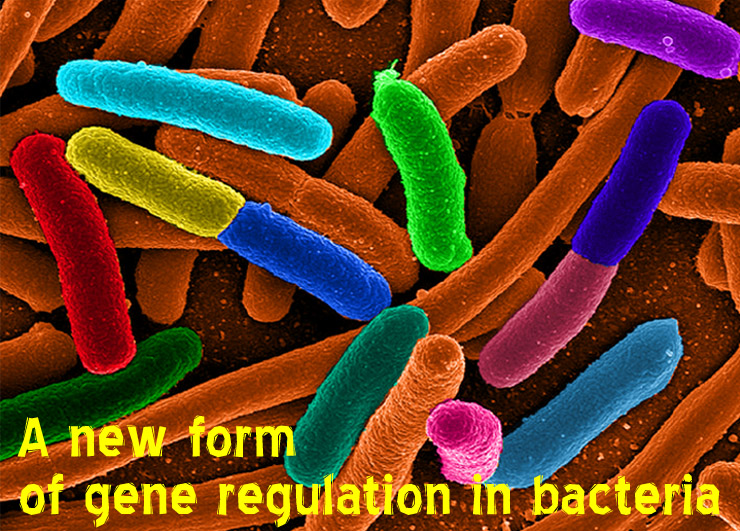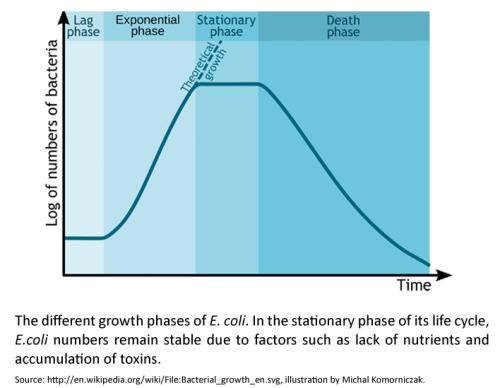A novel form of gene regulation in bacteria
Bacteria: one of the most abundant and well-studied organisms. But a finding published in Nature Communications today makes one wonder: do we really know them that well? Despite bacteria being the focus of profuse research, scientists have only now discovered an entirely new form of gene regulation in the bacterium Escherichia coli. The discovery of this new system provides valuable information on bacteria which are often used as model systems to study topics ranging from cell functioning to human diseases.
Thousands of genes are encoded in our DNA. Some are 'turned on' or 'turned off' in different stages of growth. This controlled expression of genes is critical for the survival of the organism. One of the processes that regulates this expression is methylation - a step where the cell adds a methyl group as an identifying mark to a part of its own DNA. Enzymes called methyltransferases (MTs) do this job for the cell. Once foreign DNA invades it, the cell can immediately kill unmethylated - unmarked - DNA using enzymes called restriction endonucleases. Bacterial cells, like ours, bank on this system to fight against foreign DNA.
Apart from playing a role in the bacterial immune system, methylation has other functions. MTs engage in two kinds of methylation - cytosine methylation, where the 'C' bases that make up DNA are methylated; and adenine methylation, where the 'A' bases are methylated. Scientists have found that adenine methylation regulates gene expression in bacteria, whereas cytosine methylation performs the same function in mammals. Recent studies hint that cytosine methylation might play a greater role in gene expression in bacteria.
To study this, Kahramanoglou and her team isolated genomic DNA of E. coli at different stages of growth (look at the figure beside for details). They sequenced the DNA after treating it with a reagent called bisulfite to help them detect methylation status. To check if cytosine methylation did play a role in gene expression, they compared the methylation status of a wild strain of E. coli that had a cytosine methylation gene (W+) with the wild strain without that gene (W-). They found that a specific protein which regulates many genes in the stationary growth phase (called rpoS) while present in normal levels in the wild strain (W+), was in far higher levels in the lab strain (W-). Since the only difference between both strains was the presence of a cytosine methylation gene, the authors feel that cytosine methylation in the wild strain (W+) is the only factor that limited, and thus regulated gene expression in it. Previous research shows that this is the same process that regulates gene expression in complex eukaryotes - mammals.
Studies examine such nuances of cell functioning mostly at the level of a single gene or pathway. One special feature of this study is that Kahramanoglou and her colleagues examined entire genomes of E. coli. This approach gave them access to high resolution information which led them to the discovery of the role of cytosine methylation in bacterial gene regulation.
While cytosine methylation plays an important role in bacterial gene expression, it has a dangerous side too. Regions that undergo cytosine methylation are mutation hotspots. And some of these mutations can be deleterious. Regions in the bacterial DNA that undergo cytosine methylation therefore run the risk of harmful mutations. Previous research indicates that luckily, E.coli has found a way out. It produces a repair protein in the stationary phase ("very short (patch) repair" or "vsr"), which can revert such mutated regions back to normal. Yet this repair protein is found only in the stationary phase. In phases like the exponential phase, where the repair protein is not found, how does E.coli take care of such errors?
The authors conclude from their experiments that methylation in the absence of vsr does not happen randomly. In the exponential phase where there is a possibility that occurring mutations can be deleterious, MTs methylate native DNA at a lower frequency than usual. Thus, non-methylation might prevent unnecessary mutations in E.coli in the absence of vsr.
It gets more interesting from here: not all bacteria are the same. Prior research shows for instance, that the cholera-causing bacterium Vibrio cholerae, also possesses a cytosine methylation system, but lacks the vsr repair protein across all growth phases. Mutations formed as a result remain uncorrected and could lead to subtle differences in V. cholerae's genome. Kahramanoglou and her team analyzed the V. cholerae genome and think that ironically, this system might be helping V. cholerae evolve into dynamic genetically diverse forms. These forms could overcome resistance and better attack their hosts: humans, in this case.
While the authors are excited about their discovery, it's still early days, says one of the authors Aswin Seshasayee, currently a principal investigator at the National Centre for Biological Sciences. "It is not quite clear how prevalent gene expression control by cytosine methylation is across bacteria," he says. What he finds interesting is the possibility that MTs have acquired novel and central regulatory functions. "More broadly, I do wonder about a wider role for such DNA elements in the evolution of DNA methylation itself, irrespective of the kingdom of life," Seshasayee says.
Processes like methylation, be it in E. coli or V. cholerae, seem highly context-specific. Bacteria seem to have evolved impressive strategies and counter strategies that permit them to make the best of all worlds. It's time to think twice: one of the simplest life forms on earth may not be as simple as we take it to be. It could still be holding secrets we don't know anything about.
You can access the paper at http://www.nature.com/ncomms/journal/v3/n6/full/ncomms1878.html#/contrib-auth.


Comments
Interesting study; but
Post new comment